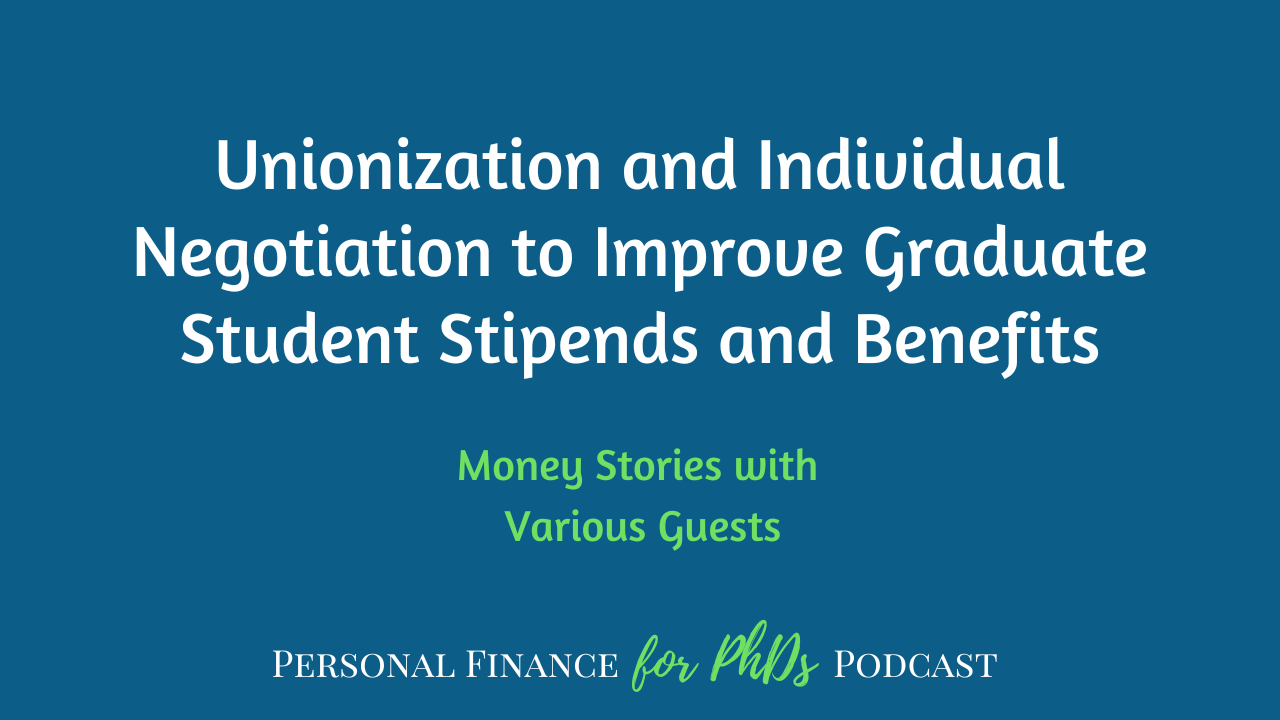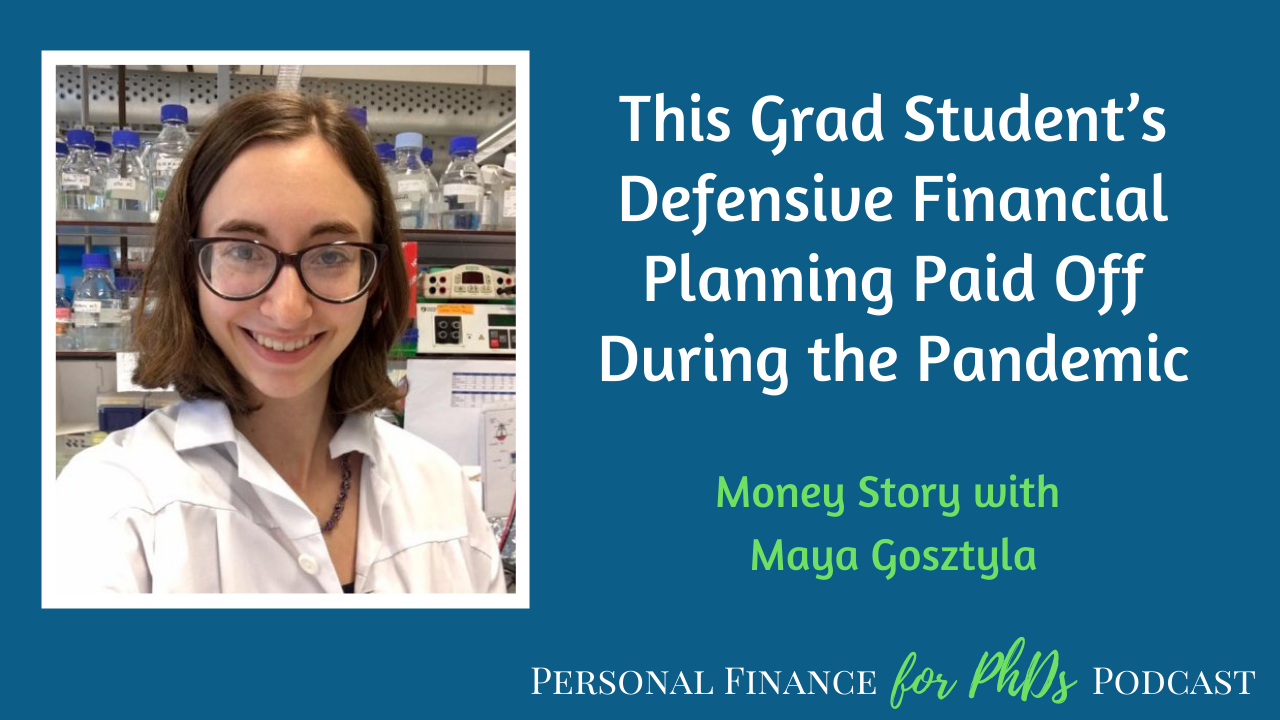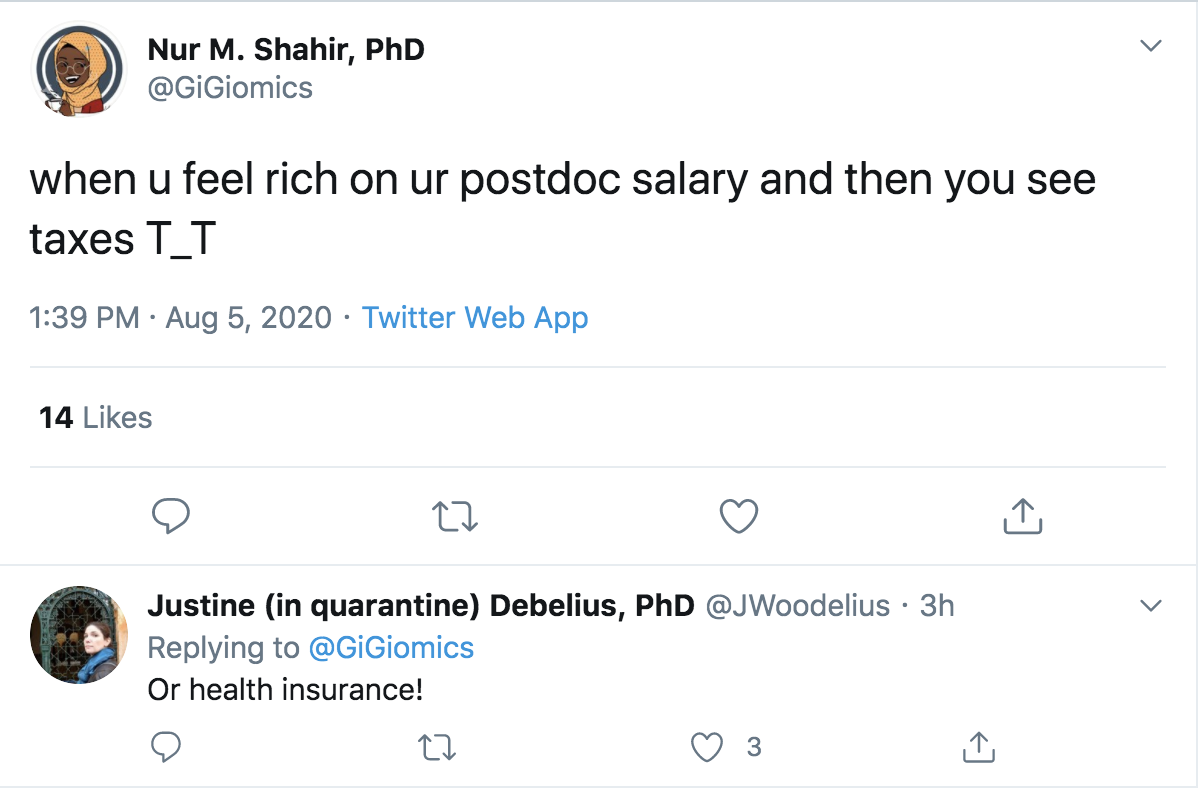In this episode, Emily shares first-person stories of graduate students enjoying improved stipends and benefits thanks to prior negotiation. The first half of the episode includes the experiences of four graduate students with their unions or when taking part in unionization movements. The second half of the episode includes four individual negotiation stories from prospective graduate students.
Links mentioned in the Episode
- Emily’s E-mail Address
- PF for PhDs S12E7: This Grad Student Advocates for Higher Stipends Using Cost of Living Data (Money Story with Alex Parry)
- PF for PhDs S5E9: Insights from the Bargaining Table with a Graduate Student Union Leader (Money Story with Mary Bugbee)
- PF for PhDs S4E14: This PhD Compares Her Experiences at a Unionized University and a Non-Unionized University (Money Story with Dr. Carly Overfelt)
- Dr. Katy Peplin, Thrive PhD
- Host a PF for PhDs Seminar at Your Institution
- PF for PhDs S8E7: Negotiating Your Grad School Stipend and Benefits: Five Success Stories (Money Stories with Various Guests)
- PF for PhDs Subscribe to Mailing List
- PF for PhDs Podcast Hub

Teaser
00:00 Katy P: But having a union means that there’s a level of protection between a department or sometimes even an individual and a graduate student. And that level of protection is the thing that in my opinion, only becomes possible under collective action, collective organizing. So I know that if I had not had a union, I wouldn’t have had anywhere to go to say like, Hey, this doesn’t seem fair, this doesn’t seem right. And because of a union, I had a system, I had clear instructions of how to do it. I had designated people to talk to. I had resources. I had people in the administration to talk to. I wasn’t alone negotiating a disagreement one on one.
Introduction
00:44 Emily: Welcome to the Personal Finance for PhDs Podcast: A Higher Education in Personal Finance. I’m your host, Dr. Emily Roberts, a financial educator specializing in early-career PhDs and founder of Personal Finance for PhDs. This podcast is for PhDs and PhDs-to-be who want to explore the hidden curriculum of finances to learn the best practices for money management, career advancement, and advocacy for yourself and others.
01:12 Emily: This is Season 15, Episode 4, and today I’m sharing first-person stories of graduate students enjoying improved stipends and benefits thanks to prior negotiation. The first half of the episode includes the experiences of four graduate students with their unions or when taking part in unionization movements. The second half of the episode includes four individual negotiation stories from prospective graduate students.
01:39 Emily: I’m beyond excited to announce that I’m offering a brand-new live one-hour seminar titled “How to Not Hate Your Fellowship During Tax Season.” It’s all about how to understand and properly handle your fellowship stipend that will not be reported on a Form W-2, which is what I call awarded income. Awarded income typically doesn’t have income tax withheld from it, which can become an unwelcome surprise and even financial hardship if the recipient is not taught what to do starting with their first paycheck of this type. In addition to teaching about estimated tax and self-withholding, I give pointers for preparing for and navigating tax season with awarded income. This seminar is intended to be taken during orientation or shortly after by people who are switching onto awarded income for the first time, so it will be exclusively available between August and October of this year. If you are starting on awarded income in the fall and your university doesn’t withhold income tax—or you’ve dealt with that scenario in the past—would you please recommend this seminar to your fellowship coordinator, program head, or graduate school? Please cc me [email protected] so I can pick up the conversation. My goal is for every grad student receiving awarded income to be forewarned about this issue before it rears its ugly head during tax season!
03:06 Emily: You can find the show notes for this episode at PFforPhDs.com/s15e4/. Without further ado, here’s our compilation episode on unions and individual negotiation.
What is Your Union or Unionization Movement Story?
03:25 Emily: This portion of the episode includes four responses to my open-ended prompt of “What is your union or unionization movement story?” If you would like to hear other episodes on unions, look up Season 12 Episode 7, Season 5 Episode 9, and Season 4 Episode 14.
Courtney’s Union Story, Oregon State University
03:49 Courtney: Hello, my name is Courtney and I am a third year Ph.D. student at Oregon State University in Corvallis, Oregon, in civil engineering. The Coalition for Graduate Employees at Oregon State was established in 1999 with the first bargaining contract in 2001 and since then, the union has successfully bargained for amazing health insurance, including dental and vision, and they have continuously raised wages and reduced student fees and provide a no strings attached hardship fund for graduate students. I directly benefit from this union by fully utilizing my health insurance. My deductible is only $100 and my co-pays are very minimal. I can go to the dentist every four months too. And my funding source is currently an external fellowship, so I’m not a full member, but I pay $10 per month to be an associate member as I still benefit from this work and I want to support them. Full membership is 2% of pretax monthly salary and is optional for grad students and assistantships and grad research assistants. The union also often has socials and provides many resources to support graduate students and assist with grievances. Full members also get discounts and deals at local establishments in Corvallis, which is pretty cool. And there are many hardworking members in this union who I am very appreciative of and make my graduate experience much more enjoyable.
Michele’s Union Story, Michigan State University
05:25 Michele: My name is Michele and I’m a Ph.D. student at Michigan State University. When I first saw MSU, I didn’t know very much about unions because of the pandemic. My department had lower participation in their graduate student organization or GSO, so there was no one to discuss unions at the orientation. However, the president of our GSO encouraged me to be our steward or graduate employees union. After I discovered that I was interested in learning more. So I’ve been representing my department for the last year and then continuing that role in the upcoming year as well. My funding is actually from fellowships and not from a teaching assistantship or a research assistant position in Michigan. Only teaching assistants are allowed to be covered under the current contract. So our research assistants and fellows are not covered under the current contract. However, the benefits that the teachers went through their contract are typically also given to RAs and fellows. For example, the previous contracts the graduate students bargained for gave to free health insurance, which was also extended to RAs and Fellows also received health insurance coverage. But we have to pay taxes on it as it is dispersed as a fellowship.
06:46 Michele: Even though RAs and fellows cannot be covered under the contract, they can join the union as affiliate members. This may change in the state of Michigan, though, as there was recently some legislation passed in the Senate that would allow us to start bargaining for a contract. I think one of the most important benefits of the union is that unites the grad students together and helps with information sharing. For example, the way fellowships are dispersed, MSU is typically in a lump sum at the beginning of the semester and during this spring semester. This past year, I did not receive my semester payment until about a month after it was stated that I was supposed to receive it on my tax form. But then I was able to contact other members of the union through our Slack channel who had a similar problem in order to resolve this issue as quickly as possible. I have also seen other members of the union get help on a myriad of other topics such as late pay and overwork. One drawback of having a formal union is that dues do need to be paid by members in order to help the union run. And then these dues are used to pay for staff organizers and paying dues to the The American Federation of Teachers and the MSU Union also had two recently increased dues for affiliate members because membership dropped a lot during the pandemic. However, as more people join the union, then the cost of running it can be spread out among more people. In addition, the benefits and pay increases that can be negotiated when the majority of graduate employees are in the union will also offset this cost.
08:31 Michele: It is also more important to make sure that you have an issue that you want to organize around, and the dues can then come later to cover the operating costs of the union once it grows. For those of you who are looking to organize a union at your own university, it will often depend on state legislation. Some states do not classify their graduate students as employees, even if they work as teaching or research assistants. And this means that they are not eligible to unionize. And a good book about learning how to organize is the secrets of a successful organizer.
09:08 Michele: And then from a personal finance point of view, the union has been beneficial to me and to all graduate students. They recently were able to negotiate a 5% raise above the minimum across the board, while bargaining has been on pause. And in addition to the health insurance, there’s also a 50% coverage on dental insurance. Overwork is also written into most union contracts, and enforcing it would also give someone more time to focus on a side hustle if they needed some extra cash. As long as it’s permitted by the university, their program. In addition, enforcing the contractual working hours, could also free up more time to focus on research.
09:54 Michele: Tuition waivers can also be negotiated into the union contract. So for MSU’s current contract, nine credits can be waived in fall and spring and five in the summer. And there’s also medical leave and bereavement leave. And so this year is also a collective bargaining year, and a new contract will be negotiated. So some of the bargaining planks that MSU has been focused on or full dental coverage, a pay increase that tracks inflation and cost of living and interest for late payments.
Katy Peplin’s Union Story, Thrive PhD
10:33 Katy P: Hi, I’m Katy Peplin from Thrive PhD, and I am a proud member of two former unions, both as a graduate student and as a teaching assistant. I was part of the UCLA union when I was there as a master’s student, and then I was part of the Graduate Student Union, GEO, at the University of Michigan my entire tenure there. I wholeheartedly believe in unions for graduate students. I think that one of the things that is most important about them is that they provide collective power in a place where individual concerns can really easily get swept under the rug. For example, when I was in my last year of teaching, I was supposed to be teaching a class which was a 50% workload. But in reality it was two sessions that I had taught for 2 hours of direct teaching, some grading, and then attending the lectures. And that assignment was switched without my knowledge or consent over the winter break into a four direct teaching hours plus screening, plus grading upper level writing class. And I was just informed that it was still going to be a 50% contract and that I would be making the same amount of money. So I immediately went to my rep and was like, Is this legal? And unfortunately it was legal, but I was able, with the help of my union, to negotiate for better terms of my pay. I was able to reduce the writing requirement and therefore the grading requirement of this class. And I knew that I would not have to rely on the word of my department and my advisors.
12:07 Katy P: So now that I work with graduate students all over the world, I think it’s really important to say that most faculty in most universities aren’t out to get graduate students. Universities run on the backs and labor of graduate students in a lot of different ways. But having a union means that there’s a level of protection between a department or sometimes even an individual and a graduate student. And that level of protection is the thing that in my opinion, only becomes possible under collective action, collective organizing. So I know that if I had not had a union, I wouldn’t have had anywhere to go to say like, Hey, this doesn’t seem fair, this doesn’t seem right. And because of a union, I had a system, I had clear instructions of how to do it. I designated people to talk to. I had resources. I had people in the administration to talk to. I wasn’t alone negotiating a disagreement one on one. My unions also made it possible for me to have livable health care, livable stipends, even if they were below the cost of cost of living at the time. And I know that those things were only possible because the group that provided so much labor for the university banded together.
13:19 Katy P: If you are a grad student who is thinking about unionizing, I really encourage you to reach out to other unions. The union that I was represented by as a Ph.D. student was formed in 1974. It’s one of the earliest university unions for teaching assistants. It’s geo at the University of Michigan, and I know that they have consulted with all sorts of burgeoning union movements all around the country. So there’s a lot of people who have walked this path before. GEO has experience dealing with shifting administrations, changing state laws, changing labor laws. They have experience with withheld pay and strike grievances and health care negotiations. And there’s a lot of information that becomes available when you start organizing in union that most graduate students don’t know anything about. Like, I had no idea what a bargaining plank was or how to get into meetings or what a provost was or who the board of Regents were. So being in a union for me was both a way to give back to the thing that was supporting me and giving me so much benefit, but also it was a really great way to learn about how universities work. Obviously, it’s a singular point of view about how a university works, and I’m sure that there are other administrations that might come back and say, You know, this isn’t exactly how it works. But for me on the ground as a union member, I learned so much about how university budgets worked, where my stipend even came from, how my health insurance was negotiated. And those are all really important skills that I’ve needed well, after I’ve left university. So even though I am no longer part of the union and I work for myself, I still use all of my union skills to think about what’s in the best interest, to look at insurance plans, to think about how budgets are made, or if I’m approaching universities to ask for funding.
15:06 Katy P: And it’s certainly something that I work with some clients every day, because the reality is that graduate school takes away from some of your prime earning your prime living years, and it’s for a good cause to create research and add to the knowledge in the world. But also there’s material impacts for taking a big chunk of your twenties or a big chunk of your twenties and thirties. Or to leave a secure job and come back to grad school. There are impacts for taking that time away. And the more that I work with people, the more I really see a distinct difference between campuses that have unions and their graduate students feel like they have some level of security, they have some level of a reliable stipend over the summer or they have some sense that their health insurance will continue from year to year, and students at universities who don’t have it.
15:56 Katy P: Sometimes it can be really easy to reduce unions to like, Oh, they’re the reason I get my good benefits or like, that’s the reason that I get a good stipend as opposed to a very crappy stipend. But I think that the the real benefit outside of those material benefits is just understanding and having some protection for these vulnerable years where you’re really giving a lot of yourself and wanting to have some protection back to them
Anonymous #1’s Unionization Story, A Private Christian university
16:25 Emily/Anonymous #1: This submission is from an anonymous contributor. Quote I’m a Ph.D. candidate and graduate assistant at a private Christian American university. When I started in my program, I was making just over half of what is considered the minimum cost of living in my city. I was not provided health insurance over the summer through my job. Needless to say, it is difficult to make ends meet in these circumstances. Eventually, the graduate assistants at my school put out a letter of demands to the university, insisting that we be fairly compensated and covered for our medical needs. We demonstrated how much money we bring into the university with each class we teach and how dependent the school is on us to teach many required courses for undergraduate students. For example, from what I can calculate when teaching just one class for one semester of 25 students, the school brings in six times more money than I am paid in a whole year. We also appealed to the school’s religious ideologies and ethics and pointed out the hypocrisy of a Christian institution taking advantage of people in this way.
17:28 Emily/Anonymous #1: The school did respond and met some of our demands, but continued to refuse to pay us a living wage. Higher ups at universities want to tell us that because we are also students, that much of our labor is an educational experience for which we should be grateful and not expect compensation. But the truth is that our labor is real work that we have trained hard to be qualified to do, and that the universities could not function without. To get a job as a graduate assistant a person must have a college degree and go through competitive selection processes. Many of us even already have master’s degrees before we start in Ph.D. programs and take these jobs. And it’s not as if we’re asking to be paid as much as professors. We are only asking for the bare minimum of what it takes to live in this particular town. But the university has refused. We realized that we weren’t going to get our basic needs met unless we united and organized. So the union effort began.
18:22 Emily/Anonymous #1: I am keeping my identity and the identity of my school. Anonymous, as we have not yet gone public with our union efforts. But we did want to take this opportunity to get our story out there so that graduate assistants at other universities would know that they aren’t alone in their struggles. Additionally, I want to say that we have been very inspired and invigorated by the efforts and successes of graduate students unionizing at other universities throughout the country. So a big thank you to all who have come before us and for the risks they took. It feels like this is a moment of progress for graduate assistants and we are excited to become a part of that. We gave our university the opportunity to write this wrong without us organizing, but they have refused. So we are going forth with our unionizing efforts. Thank you so much. Personal Finance for PhDs Podcast for having this episode and inviting me to share my story. We have a hard road ahead, but we are ready.
Commercial
19:11 Emily: Emily here for a brief interlude. Would you like to learn directly from me on a personal finance topic, such as taxes, goal-setting, investing, frugality, increasing income, or student loans, each tailored specifically for graduate students and postdocs? I offer seminars and workshops on these topics and more in a variety of formats, and I’m now booking for the 2023-2024 academic year. If you would like to bring my content to your institution, would you please recommend me as a speaker or facilitator to your university, graduate school, graduate student association, or postdoc office? My seminars are usually slated as professional development or personal wellness. Ask the potential host to go to PFforPhDs.com/speaking/ or simply email me at [email protected] to start the process. I really appreciate these recommendations, which are the best way for me to start a conversation with a potential host. The paid work I do with universities and institutions enables me to keep producing this podcast and all my other free resources. Thank you in advance if you decide to issue a recommendation! Now back to our interview.
Individual Stipend Negotiation
20:31 Emily: This portion of the episode includes four responses to my prompts regarding individual stipend negotiation. The prompts were: “What was your original stipend and benefits offer? What was the process of negotiating this offer? What was the outcome of the negotiation?” If you would like to hear another episode like this one, look up Season 8 Episode 7.
Anonymous #2, University of Georgia
20:58 Emily/Anonymous #2: This admission is from an anonymous contributor. Quote, I’m an incoming doctoral student at the university of Georgia, located in Athens, Georgia. I’m in the social sciences.
What Was Your Original Stipend and Benefits Offer?
21:09 Emily/Anonymous #2: My department gave me an offer of a research assistantship and they nominated me for a university wide fellowship. The RA-ship pays $26,000, and the fellowship is $7,000 per year for four years. In addition, my tuition is waived, and every student in my department gets a $500 conference stipend per semester. All in all, I am receiving funding from two sources, one from my department and one from the university overall.
21:35 Emily/Anonymous #2: I also had a competing offer, which is what allowed me to feel comfortable negotiating with my department. The other offer was about $5,000 more a year at a roughly comparable institution. Both are one SEC schools, although the departments and selves aren’t as comparable. That offer was also comprised an assistantship and fellowship with the extra $5,000 coming from the fellowship.
What Was the Process of Negotiating This Offer?
21:57 Emily/Anonymous #2: At the time I had these offers, I was also in the last year of my master’s program, and I was really well-positioned to negotiate by virtue of my existing professional connections. Members of my faculty knew the faculty at both of the institutions I was looking at, so I asked them if negotiations were the norm in our field or if I would be perceived as out of step. I also think it’s worth asking the newer faculty in your department what they did when entering grad school and during their job search, because the tenured professors haven’t job search in a while, so their norms and experiences might not be as up to date for the actual negotiations.
22:31 Emily/Anonymous #2: I drafted an email that laid out that I had a competing offer and asked if there is anything else I should consider while making a decision. I wasn’t sure what would shake out as a result of me asking, and I was told asking directly for more money wouldn’t be the best way to approach negotiations. So I gave them an opportunity to sell me on the program. I had been corresponding with the program coordinator, so that’s who I sent the email to.
What Was the Outcome of the Negotiation?
22:54 Emily/Anonymous #2: They responded with a very kind email that basically said that they weren’t surprised I had other offers and they offered me a named department award that was specifically for professional development funding for $5,000 over four years.
23:06 Emily/Anonymous #2: I was happy for a few reasons. One, it showed me the department was willing to invest in me. Two, I got the money I asked for, and three, because it was a named award. I can put it on my CV. At that point, I went ahead and immediately accepted the offer and let everyone involved know that it had worked out. Ultimately, I’m glad I negotiated it because I got the funding I requested and because it told me more about the department culture than anything else could have. I also feel really well-positioned to take advantage of conferences and professional opportunities in my field without worrying about how I’ll pay for them. I would recommend negotiating as a graduate student, even if just to see how the department reacts. In most cases, it’s a reasonable request. So if they respond with disapproval, that could be a sign for your future in that department, end quote.
Anonymous #3, a Large Public University in the Midwest
23:58 Anonymous #3: So I just completed the second year of a five year humanities doctoral program at a large public university in the Midwest. My current program was my top choice during the application process, and thanks to guidance from the Personal Finance for PhDs podcast, I was able to use the offer for my second choice program to negotiate and improve the financial package of my top choice program.
What Was Your Original Stipend and Benefits Offer?
24:22 Anonymous #3: Originally, my top choice offered me a five year funding package that included a two year fellowship to be used during a first and last year of my graduate studies. This fellowship relieves me of teaching duties and also offers a higher stipend. The original 12 month stipend was $28,316, but the university increased the stipend right before my first semester to $30,420. So this is the amount I received during my first year when I was on fellowship and I will receive this amount or perhaps even more if the university decides to increase it again for my fifth and final year. My remaining three years of graduate study are funded by a teaching assistantship. So as a GTA, I teach one course per semester. The nine month GTA stipend is $21,280 in my department. There seems to be more and more opportunity to teach a course over the summer, which pays approximately an additional $7,000 on top of that nine months stipend. However, this is not a guarantee and international students have priority over domestic students for these positions, specifically in my department.
25:29 Anonymous #3: My second choice program offered me a 12 month, $24,000 stipend for the five year program, in addition to an extra $5,000 to be used for research over the course of the five years. So in total, the financial package is about $5,000 more than that of my first choice program. But of course, this is not taking into account small differences in fees.
What was the process of negotiating this offer?
25:51 Anonymous #3: Ultimately, I sent a brief direct email to the DGS at my top choice program. I explained that I was deciding between two programs and that the other program of interest, which I named specifically in the email, had offered a more competitive funding package which included guaranteed summer funding. And I outlined all of the details of the funding package in the email to the DGS.
What was the outcome of the negotiation?
26:13 Anonymous #3: My negotiation process was actually quite easy. The DGS responded the next day and offered an additional $6,000, a lump sum that I could use any way I wished. So there was really no back and forth. I sent the email. I asked if there was anything that they could do to increase the financial package, and they responded and said, yes, here’s an additional $6,000.
26:33 Anonymous #3: So this is the financial commitment that I needed to make my final decision. I accepted the offer and I received this cash amount when I arrived on campus. Ultimately, my second choice program has since increased stipends to $30,000 per year. However, my current program has also made changes to funding packages. Summer teaching opportunities have increased in my department specifically for domestic students, and health insurance will soon be covered 100% by the university, so my first two years there was an 85% subsidy. So it seems to me that financial packages can really shift and evolve over the course of one’s program. But I think it’s critical to make sure that you have a guaranteed financial package that is workable for you from the very beginning. For me, as a 31 year old doctoral student who left a career to pursue a PhD in a completely different field, financial security is really important and pursuing programs with strong funding packages in affordable cities and then negotiating with my top choice and continuing to seek out additional grants and awards now that I’m here has been really important for my success in the program and also for my well-being overall.
Anonymous #4
27:47 Emily/Anonymous #4: This next contribution was submitted anonymously. Quote, Hello. Newly minted Ph.D. student here today. I’ll be telling you a bit about my experience of “negotiating” my offer letter for grad school. I say negotiating with air quotes because my experience was not the typical case of using an offer from one school as leverage to improve your offer at another school. But I think my experience can help motivate others to negotiate, which is why I’m happy to share.
28:14 Emily/Anonymous #4: So for a bit of back story, I knew from early on during my undergraduate education that I wanted to go to graduate school. However, the research I was doing as an undergrad wasn’t something I was super passionate about. By my senior year, I found a research area that was more interesting to me, But felt that I wasn’t ready to apply to grad school since I’d be switching fields in order to gain a better understanding of the state of the field and really specify a topic. I could devote six years of my life to. I worked as a lab tech for two years doing research in the field. I thought I wanted to pursue in graduate school and yay, I was correct in my judgment. I found a research topic I really enjoyed. The downside to this perhaps, was that I consequently narrowed my options for grad programs.
28:58 Emily/Anonymous #4: I ended up applying to two programs that are both direct admit, so I knew which lab I’d be joining and have a general idea for a project I’d work on. Following interviews, I realized that one of the labs was not the right fit for me. So by the end of the application cycle, I only had one offer letter. Now, during my interview at this institution, two PI’s, neither of whom were the P.I. I was interviewing for, and one of whom was on the grad committee. Both encouraged me to negotiate my offer. Then, prior to receiving the offer letter my PI emailed me saying we should zoom once I got it so we can go over the details and, quote, discuss anything I’d want to negotiate. So I was confident that negotiation was not taboo for this program and was reassured that my PI would even help me.
What was your original stipend and benefits offer?
29:41 Emily/Anonymous #4: But how exactly do you negotiate without the leverage of another offer? You just ask. My original offer was a 12 month appointment with a stipend of $32,000 for my first two years. Then the departmental rate guaranteed for nine month appointments for three more years, as well as an additional departmental award to be paid over my first three years. Even though I didn’t have another offer, I was still planning to ask for smaller things such as relocation assistance. Then I was awarded the NSF Graduate Research Fellowship. With the Fellowship. I recognized I had a little bit more bargaining power, but at the end of the day, there was only one school I’d be able to take it to. Still, I knew that my PI and department were generally okay with negotiations, so I figured I had nothing to lose if I asked for more.
What was the process of negotiating this offer?
30:26 Emily/Anonymous #4: I first zoomed with my PI, That’s when I asked about relocation assistance. But I followed up on that zoom call with an email basically saying, I’ve heard that other NSF recipients asked for these things. Is any of this even possible? And listed the following agreement to pay the NSF stipend on non-NSF years: partial control of the $12,000 cost of education fund that is part of the fellowship and a sign up bonus.
What was the outcome of the negotiation?
30:52 Emily/Anonymous #4: My plan was to gauge what my PI thought would be reasonable requests, then go forward with only those. But they actually just went ahead and asked about all of them. And two days later I had my answers. First, the school will match the NSF statement. First, the school will match the NSF stipend on non NSF years. Second, I won’t have control over the $12,000 funds. However, the school may top it off with $2,000 that I can use for conferences, workshops, etc. I say may because this component is negotiated separately from the stipend and is still in the works. Third, a sign on bonus is not possible. However, the department award in my original offer letter was reworked into a larger amount that I will receive in my fifth year. So while it’s not technically a sign on bonus, it is an additional lump sum that I’m being guaranteed. And finally, my PI can reimburse up to $600 in relocation costs.
31:48 Emily/Anonymous #4: So overall, my negotiation, which was nothing more than just asking, was largely successful. I do want to note that there are two important factors to consider in my case. One, because this is a direct admit program, my PI was in my corner doing the asking for me. I never did any of the negotiation with the department directly, which may be the case for those entering rotation programs and why asking can be more intimidating for others. Second, my PI has external non-government funding which allows for more flexibility in how it’s spent. I’m almost certain that I would not get the NSF stipend match nor relocation assistance if my PI didn’t have private funding. So it can be useful to know what sources of funding your potential PI has to help you gauge if certain asks are reasonable versus unreasonable. I hope my story will help motivate others to ask for more than what their initial offer consists of. Whether they have offers from five schools or one school. And even if you don’t have an external fellowship like I did at the end of the day, the school offered you a spot. They want you there. I truly believe that making reasonable requests will not hurt you in the eyes of a university that wants you to commit to their program. You’re never going to have an answer unless you ask. End quote.
Anonymous #5, Negotiation Advice
33:06 Emily/Anonymous #5: This is from an anonymous contributor. Quote, I will be starting in a PhD program in fall 2023. After some correspondence with the professor in charge, I managed to secure a bit of additional funding. My advice is to think of the process as just asking questions instead of negotiation. Make a convincing case and focus on controllable and movable points.
33:30 Emily/Anonymous #5: One. Thinking of the process as simply a communication exchange helped me in two ways. By removing the pressure of negotiation, it helped me to think clearly about what I need to support myself financially and the pressure points in the initial offer, e.g. rent. And as such it help me to communicate clearly about my financial concerns. Admitted, but not accepted is the time to discuss financial details and faculty fully expect students to ask questions and are prepared to leverage their resources to adjust offers to convince students to join
34:06 Emily/Anonymous #5: Two. Making a convincing case stemmed from thinking concretely about how I would support myself on the initial offer and subsequently asking questions that were detailed and specific. Asking many detailed questions served as evidence of real and reasonable financial and material concerns. I had. Functionally, this worked analogous to asking research questions in the statement of purpose.
34:28 Emily/Anonymous #5: Three. focusing on controllable and movable points made this correspondence actually productive. What are the principal pressure points in my current offer? What tools does the program have at their disposal to improve offers? Often they do not have much wiggle room over a pure stipend amount, but have other programs or fellowships they can leverage. Focusing on effective and real possible offer adjustments helped me to help the professor better understand what they could do to turn an admission offer into an accepted offer. Relatedly, I advise taking advantage of additional funding opportunities, such as filling out optional personal statements, end quote.
Outtro
35:14 Emily: Listeners, thank you for joining me for this episode! I have a gift for you! You know that final question I ask of all my guests regarding their best financial advice? My team has collected short summaries of all the answers ever given on the podcast into a document that is updated with each new episode release. You can gain access to it by registering for my mailing list at PFforPhDs.com/advice/. Would you like to access transcripts or videos of each episode? I link the show notes for each episode from PFforPhDs.com/podcast/. See you in the next episode, and remember: You don’t have to have a PhD to succeed with personal finance… but it helps! The music is “Stages of Awakening” by Podington Bear from the Free Music Archive and is shared under CC by NC. Podcast editing by Dr. Lourdes Bobbio and show notes creation by Dr. Jill Hoffman.









